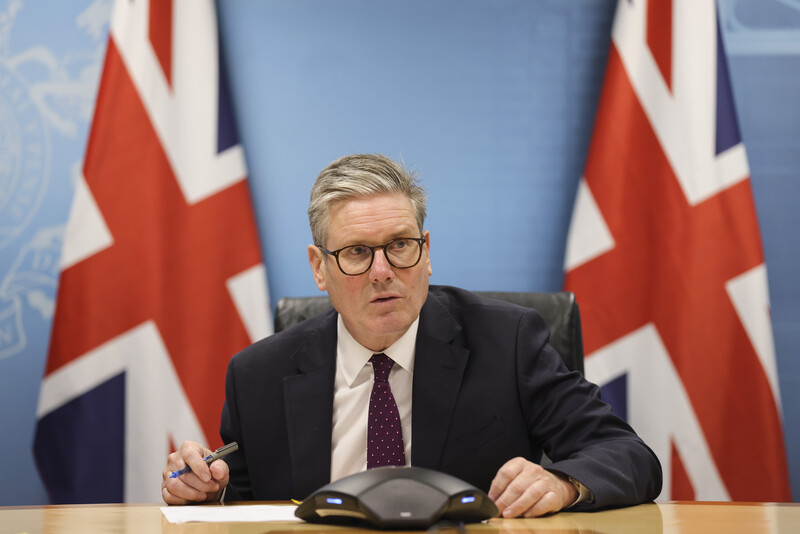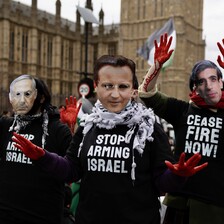The Electronic Intifada 3 April 2025

British Prime Minister Keir Starmer on the phone to his Israeli counterpart Benjamin Netanyahu.
AvalonDuring a parliamentary debate in November last year, independent lawmaker Ayoub Khan reminded British Prime Minister Keir Starmer that genocide was defined by Article 2 of the UN Genocide Convention and asked him what his definition of genocide was.
Starmer replied that he was, “well aware of the definition of genocide, and that is why I have never described this or referred to it as genocide.”
In December 2023, South Africa filed a case against Israel at the International Court of Justice (ICJ), accusing Israel of committing genocide in Gaza, as defined by Article 2 of the Genocide Convention.
Article 2 lists acts that constitute genocide, including the intentional destruction of a national, ethnic, racial or religious group, through acts such as killing, inflicting harm, and creating destructive conditions.
On 26 January 2024, the ICJ concluded in a preliminary finding that Israel’s actions in Gaza constituted “plausible” genocide and agreed to hear South Africa’s case. Britain is a signatory to the ICJ and has made a declaration accepting its compulsory jurisdiction.
Despite the ICJ’s preliminary finding – and, even more damning, a recent UN report confirming that Israel’s actions in Gaza are “consistent with the characteristics of genocide” – Starmer has continued to refuse to label Israel’s actions in Gaza as genocide.
This refusal to acknowledge the findings of both the ICJ and the UN underscores Starmer’s ongoing reluctance to confront the scale of the atrocities being committed.
Similarly, UK Foreign Secretary David Lammy last year also made the claim in Parliament that no genocide was occurring in Gaza – because not enough people had died, he argued.
In his response to Conservative lawmaker Nick Timothy’s request that the Foreign Secretary “take this opportunity to say that there is not a genocide occurring in the Middle East,” Lammy said that: “I agree with the honorable gentleman that those terms were largely used when millions of people lost their lives in crises such as Rwanda and the Holocaust of the second world war. The way that people are now using those terms undermines their seriousness.”
Genocide denial
However, both men have used the word genocide for other areas of the world, involving far less deaths than in Gaza.
To claim that genocide is not occurring in Gaza ultimately serves to benefit Israel. Such denial deflects international scrutiny and shields Israel from legal consequences on the global stage, protecting its military and political interests.
However, Starmer and Lammy’s approach does not fundamentally change the UK’s commitments under domestic law. For example, denying Israel’s genocide has no bearing on the UK’s Strategic Export Licensing Criteria, which governs military exports. These criteria do not require a determination of genocide to restrict arms sales, but instead focus on violations of international humanitarian law – a far lower threshold.
Similarly, war crimes and crimes against humanity are punishable under UK domestic law regardless of whether a genocide is formally recognised.
On the contrary, genocide denialism undermines the UK’s interests and damages its international reputation. By refusing to acknowledge credible determinations of genocide, Starmer risks weakening the UK’s credibility and diminishing confidence in its commitment to upholding international treaties and obligations.
It is not a surprise that both men have attempted to deny Israel’s genocide of the Palestinians. Starmer and Lammy were both listed as parliamentary supporters of Labour Friends of Israel in its last publicly available list (before the group deleted it from their website shortly before the last election).
Israel lobby
Both Starmer and Lammy have also received significant funding from pro-Israeli lobbyists. Starmer says that he supports Zionism “without qualification,” apparently meaning that no war crime committed by Zionists will ever make him waver in his support.
But although these Labour Friends of Israel lawmakers are both trying to redefine the term genocide for the sole benefit of Israel, their personal opinions are irrelevant.
The UK government has consistently confirmed that its long-standing position on acknowledging genocide is that it is for courts to determine and not government.
In recognising the Islamic State genocide of the Yazidis in Iraq, for example, the government confirmed that its position “has always been that determinations of genocide should be made by competent courts, rather than by governments or non-judicial bodies [such as parliament].”
In the UK Uyghur Tribunal, Dominic Raab (then deputy prime minister) confirmed that “competent courts” includes the ICJ: “It has been the government’s long-standing policy that any determination of genocide should only be made by competent courts, rather than by governments or non-judicial bodies. Competent courts include international courts, such as the International Criminal Court and the International Court of Justice, and national criminal courts that meet international standards of due process.”
Consequently, it matters little what Lammy or Starmer’s personal views are on the genocide in Gaza or their denial of it. The UK’s position has consistently been that the determination of genocide is a matter for the courts, not for political debate.
Plausibly genocide
The International Court of Justice has already established that there is a plausible case for genocide in Gaza.
Both the prime minister and the foreign secretary have a duty to the UK to accept the ICJ’s findings and publicly acknowledge the plausible genocide being committed by Israel in Gaza.
Formal acknowledgement of the ICJ’s ruling of plausible genocide would have serious and immediate consequences for the UK’s dealings with Israel. In the first instance, it would mean that in determining whether to grant export licenses of arms to Israel, the “clear risk” requirement of the Export Criteria is overwhelmingly met by the ICJ ruling.
This is established in criterion two of the export criteria which does not require a finding of genocide to halt arm sales: “Having assessed the recipient country’s attitude towards relevant principles established by instruments of international humanitarian law, the government will … not grant a licence if it determines there is a clear risk that the items might be used to commit or facilitate a serious violation of international humanitarian law.”
This would mean all export licenses would have to be halted immediately and that, under domestic law, the UK would no longer be able to provide support to Israel in its commission of war crimes and genocide.
Sections 52-55 of the International Criminal Court Act 2001 make it an offence to aid or abet the committing of genocide, war crimes or crimes against humanity. This of course includes flying reconnaissance flights over Gaza or offering military assistance.
Foreign Office civil servants are increasingly emboldened to speak out about Britain’s growing complicity with Israel’s war crimes, and with an expedited judicial review granted by the High Court over the UK’s continued arms trade to Israel, it might well be that Keir Starmer ends up with no choice but to finally accept the ICJ’s interim ruling that genocide is plausibly occurring in Gaza.
Ayesha Khan is the Director of Legal Action for Peace, an organisation dedicated to challenging anti-Muslim hate.




Comments
Does Britain respect the ICJ or not?
Permalink Richard Comaish replied on
It's a simple enough question, and the innocent surely deserve an answer?
UK Legally obliged to stop arming Israel
Permalink Abe Hayeem replied on
It seems a no-brainer that the UK is breaching its own restrictions to selling arms to Israel, when it is so clear that the F35's to which the UK provides vital spare parts, are the weapons that deliver the deadly bombardments that have wiped out Gaza, its total infrastructure, and west of all its people. It has established the conditions that prevent lifesaving food, water, fuel and medical supplies, and prevent any aid from getting in, without any action being taken as per the ICJ ruling asking states to do just that.
Why is no-one launching a legal case against Starmer and Tammy and Emily Thornberry, and also the Tory leaders Sunak and Johnson and whoever was foreign secretary at that time. This must be done urgently by various institutions and solidarity groups, and concerned lawyers acting pro-bono.
Add new comment